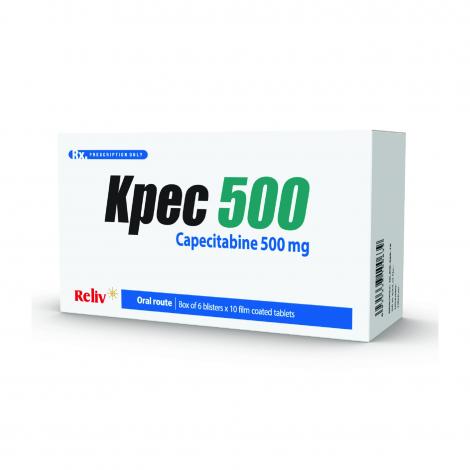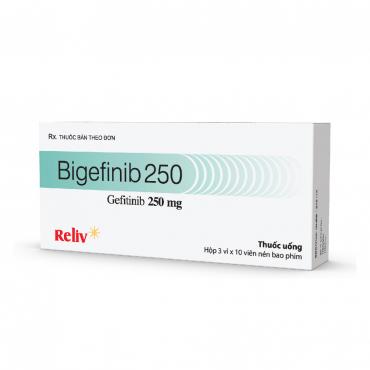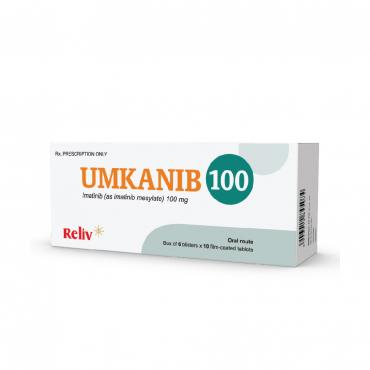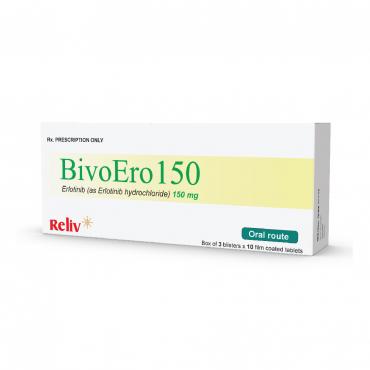Capecitabine should only be prescribed by a qualified physician experienced in the utilisation of antineoplastic medicinal products. Careful monitoring during the first cycle of treatment is recommended for all patients.
Treatment should be discontinued if progressive disease or intolerable toxicity is observed. Standard and reduced dose calculations according to body surface area for starting doses of Capecitabine of 1250 mg/m2 and 1000 mg/m2 are provided in tables 1 and 2, respectively.
Posology
Monotherapy
Colon, colorectal and breast cancer
Given as monotherapy, the recommended starting dose for capecitabine in the adjuvant treatment of colon cancer, in the treatment of metastatic colorectal cancer or of locally advanced or metastatic breast cancer is 1250 mg/m2 administered twice daily (morning and evening; equivalent to 2500 mg/m2 total daily dose) for 14 days followed by a 7-day rest period. Adjuvant treatment in patients with stage III colon cancer is recommended for a total of 6 months.
Combination therapy
Colon, colorectal and gastric cancer
In combination treatment, the recommended starting dose of capecitabine should be reduced to 800-1000 mg/m2 when administered twice daily for 14 days followed by a 7-day rest period, or to 625 mg/m2 twice daily when administered continuously. For combination with irinotecan, the recommended starting dose is 800 mg/m2 when administered twice daily for 14 days followed by a 7-day rest period combined with irinotecan 200 mg/m2 on day 1. The inclusion of bevacizumab in a combination regimen has no effect on the starting dose of capecitabine. Premedication to maintain adequate hydration and anti-emesis according to the cisplatin summary of product characteristics should be started prior to cisplatin administration for patients receiving the capecitabine plus cisplatin combination. Premedication with antiemetics according to the oxaliplatin summary of product characteristics is recommended for patients receiving the capecitabine plus oxaliplatin combination. Adjuvant treatment in patients with stage III colon cancer is recommended for duration of 6 months.
Breast cancer
In combination with docetaxel, the recommended starting dose of capecitabine in the treatment of metastatic breast cancer is 1250 mg/m2 twice daily for 14 days followed by a 7- day rest period, combined with docetaxel at 75 mg/m2 as a 1hour intravenous infusion every 3 weeks. Premedication with an oral corticosteroid such as dexamethasone according to the docetaxel summary of product characteristics should be started prior to docetaxel administration for patients receiving the capecitabine plus docetaxel combination.
Capecitabine Dose Calculations
Table 1 Standard and reduced dose calculations according to body surface area for a starting dose of capecitabine of 1250 mg/m2
|
Dose level 1250 mg/m2 (twice daily) |
||||
|
|
Full dose 1250 mg/m2 |
Number of 150 mg tablets and/or 500 mg tablets per administration (each administration to be given morning and evening) |
Reduced dose (75%) 950 mg/m2 |
Reduced dose (50%) 625 mg/m2 |
|
Body Surface Area (m2) |
Dose per administration (mg) |
500 mg |
Dose per administration (mg) |
Dose per administration (mg) |
|
≤ 1,26 |
1500 |
3 |
1150 |
800 |
|
1,27 – 1,38 |
1650 |
3 |
1300 |
800 |
|
1,39 – 1,52 |
1800 |
3 |
1450 |
950 |
|
1,53 – 1,66 |
2000 |
4 |
1500 |
1000 |
|
1,67 – 1,78 |
2150 |
4 |
1650 |
1000 |
|
1,79 – 1,92 |
2300 |
4 |
1800 |
1150 |
|
1,93 – 2,06 |
2500 |
5 |
1950 |
1300 |
|
2,07 – 2,18 |
2650 |
5 |
2000 |
1300 |
|
≥ 2,19 |
2800 |
5 |
2150 |
1450 |
Table 2 Standard and reduced dose calculations according to body surface area for a starting dose of capecitabine of 1000 mg/m2
|
Dose level 1000 mg/m2 (twice daily) |
||||
|
|
Full dose 1000 mg/m2 |
Number of 150 mg tablets and/or 500 mg tablets per administration (each administration to be given morning and evening) |
Reduced dose (75%) 750 mg/m2 |
Reduced dose (50%) 500 mg/m2 |
|
Body Surface Area (m2) |
Dose per administration (mg) |
500 mg |
Dose per administration (mg) |
Dose per administration (mg) |
|
≤ 1,26 |
1150 |
2 |
800 |
600 |
|
1,27 – 1,38 |
1300 |
2 |
1000 |
600 |
|
1,39 – 1,52 |
1450 |
2 |
1100 |
750 |
|
1,53 – 1,66 |
1600 |
2 |
1200 |
800 |
|
1,67 – 1,78 |
1750 |
2 |
1300 |
800 |
|
1,79 – 1,92 |
1800 |
3 |
1400 |
900 |
|
1,93 – 2,06 |
2000 |
4 |
1500 |
1000 |
|
2,07 – 2,18 |
2150 |
4 |
1600 |
1050 |
|
≥ 2,19 |
2300 |
4 |
1750 |
1100 |
Posology adjustments during treatment:
General
Toxicity due to capecitabine administration may be managed by symptomatic treatment and/or modification of the dose (treatment interruption or dose reduction). Once the dose has been reduced, it should not be increased at a later time. For those toxicities considered by the treating physician to be unlikely to become serious or life-threatening, e.g. alopecia, altered taste, nail changes, treatment can be continued at the same dose without reduction or interruption. Patients taking capecitabine should be informed of the need to interrupt treatment immediately if moderate or severe toxicity occurs. Doses of capecitabine omitted for toxicity are not replaced. The following are the recommended dose modifications for toxicity:
Table 3 Capecitabine Dose Reduction Schedule (3-weekly Cycle or Continuous Treatment)
|
Toxicity grades NCIC * |
Dose changes within a treatment cycle |
Dose adjustment for next cycle/dose (% of starting dose) |
|
* Grade 1 |
Maintain dose level |
Maintain dose level |
|
* Grade 2 |
||
|
1st appearance |
Interrupt until resolved to grade 0-1 |
100% |
|
2nd appearance |
75% |
|
|
3rd appearance |
50% |
|
|
4th appearance |
|
Not applicable |
|
* Grade 3 |
||
|
1st appearance |
Interrupt until resolved to grade 0-1 |
75% |
|
2nd appearance |
50% |
|
|
3rd appearance |
Discontinue treatment permanently |
Not applicable |
|
* Grade 4 |
||
|
1st appearance |
Discontinue permanently or If physician deems it to be in the patient's best interest to continue, interrupt until resolved to grade 0-1 |
50% |
|
2nd appearance |
Discontinue permanently |
Not applicable |
According to the National Cancer Institute of Canada Clinical Trial Group (NCIC CTG) Common Toxicity Criteria (version 1) or the Common Terminology Criteria for Adverse Events (CTCAE) of the Cancer Therapy Evaluation Program, US National Cancer Institute, version 4.0. For hand-foot syndrome and hyperbilirubinemia
Haematology:
Patients with baseline neutrophil counts of <1.5 x 109/L and/or thrombocyte counts of <100 x 109/L should not be treated with capecitabine. If unscheduled laboratory assessments during a treatment cycle show that the neutrophil count drops below 1.0 x 109/L or that the platelet count drops below 75 x 109/L, treatment with capecitabine should be interrupted.
Dose modifications for toxicity when capecitabine is used as a 3weekly cycle in combination with other medicinal products
Dose modifications for toxicity when capecitabine is used as a 3weekly cycle in combination with other medicinal products should be made according to table 3 above for capecitabine and according to the appropriate summary of product characteristics for the other medicinal product(s).
At the beginning of a treatment cycle, if a treatment delay is indicated for either capecitabine or the other medicinal product(s), then administration of all therapy should be delayed until the requirements for restarting all medicinal products are met.
During a treatment cycle for those toxicities considered by the treating physician not to be related to capecitabine, capecitabine should be continued and the dose of the other medicinal product should be adjusted according to the appropriate Prescribing Information.
If the other medicinal products(s) have to be discontinued permanently, capecitabine treatment can be resumed when the requirements for restarting capecitabine are met.
This advice is applicable to all indications and to all special populations.
Dose modifications for toxicity when capecitabine is used continuously in combination with other medicinal products
Dose modifications for toxicity when capecitabine is used continuously in combination with other medicinal products should be made according to table 3 above for capecitabine and according to the appropriate summary of product characteristics for the other medicinal products(s).
Posology adjustments for special populations:
Hepatic impairment
Insufficient safety and efficacy data are available in patients with hepatic impairment to provide a dose adjustment recommendation. No information is available on hepatic impairment due to cirrhosis or hepatitis.
Renal impairment
Capecitabine is contraindicated in patients with severe renal impairment (creatinine clearance below 30 ml/min [Cockcroft and Gault] at baseline). The incidence of grade 3 or 4 adverse reactions in patients with moderate renal impairment (creatinine clearance 30-50 ml/min at baseline) is increased compared to the overall population. In patients with moderate renal impairment at baseline, a dose reduction to 75% for a starting dose of 1250 mg/m2 is recommended. In patients with moderate renal impairment at baseline, no dose reduction is required for a starting dose of 1000 mg/m2. In patients with mild renal impairment (creatinine clearance 51-80 ml/min at baseline) no adjustment of the starting dose is recommended. Careful monitoring and prompt treatment interruption is recommended if the patient develops a grade 2, 3 or 4 adverse event during treatment and subsequent dose adjustment as outlined in table 3 above. If the calculated creatinine clearance decreases during treatment to a value below 30 ml/min, Capecitabine should be discontinued. These dose adjustment recommendations for renal impairment apply both to monotherapy and combination use.
Elderly
During capecitabine monotherapy, no adjustment of the starting dose is needed. However, grade 3 or 4 treatment-related adverse reactions were more frequent in patients ≥ 60 years of age compared to younger patients.
When capecitabine was used in combination with other medicinal products, elderly patients (≥ 65 years) experienced more grade 3 and grade 4 adverse drug reactions, including those leading to discontinuation, compared to younger patients. Careful monitoring of patients ≥ 60 years of age is advisable.
- In combination with docetaxel: an increased incidence of grade 3 or 4 treatment-related adverse reactions and treatment-related serious adverse reactions were observed in patients 60 years of age or more (see section 5.1). For patients 60 years of age or more, a starting dose reduction of capecitabine to 75% (950 mg/m2 twice daily) is recommended. If no toxicity is observed in patients ≥ 60 years of age treated with a reduced capecitabine starting dose in combination with docetaxel, the dose of capecitabine may be cautiously escalated to 1250 mg/m2 twice daily.
Paediatric population
There is no relevant use of capecitabine in the pediatric population in the indications colon, colorectal, gastric and breast cancer.
Method of administration
Capecitabine tablets should be swallowed whole with water within 30 minutes after a meal.
Capecitabine tablets should not be crushed or cut.
- History of severe and unexpected reactions to fluoropyrimidine therapy
- Hypersensitivity to capecitabine or to any of the excipients of this drug or fluorouracil
- Known complete dihydropyrimidine dehydrogenase (DPD) deficiency
- During pregnancy and lactation
- In patients with severe leukopenia, neutropenia, or thrombocytopenia
- In patients with severe hepatic impairment
- In patients with severe renal impairment (creatinine clearance below 30 ml/min)
- Recent or concomitant treatment with brivudine
- If contraindications exist to any of the medicinal products in the combination regimen, that medicinal product should not be used.
Dose limiting toxicities include diarrhoea, abdominal pain, nausea, stomatitis and hand-foot syndrome (hand-foot skin reaction, palmar-plantar erythrodysesthesia). Most adverse reactions are reversible and do not require permanent discontinuation of therapy, although doses may need to be withheld or reduced.
Diarrhoea. Patients with severe diarrhoea should be carefully monitored and given fluid and electrolyte replacement if they become dehydrated. Standard antidiarrhoeal treatments (e.g. loperamide) may be used. Dose reduction should be applied as necessary.
Dehydration. Dehydration should be prevented or corrected at the onset. Patients with anorexia, asthenia, nausea, vomiting or diarrhoea may rapidly become dehydrated. If grade 2 (or higher) dehydration occurs, capecitabine treatment should be immediately interrupted and the dehydration corrected. Treatment should not be restarted until the patient is rehydrated and any precipitating causes have been corrected or controlled. Dose modifications applied should be applied for the precipitating adverse event as necessary.
Hand-foot syndrome (also known as hand-foot skin reaction or palmar-plantar erythrodysesthesia or chemotherapy induced acral erythema). Grade 1 hand- foot syndrome is defined as numbness, dysesthesia/paresthesia, tingling, painless swelling or erythema of the hands and/or feet and/or discomfort which does not disrupt the patient's normal activities.
Grade 2 hand- foot syndrome is painful erythema and swelling of the hands and/or feet and/or discomfort affecting the patient's activities of daily living.
Grade 3 hand- foot syndrome is moist desquamation, ulceration, blistering and severe pain of the hands and/or feet and/or severe discomfort that causes the patient to be unable to work or perform activities of daily living. Persistent or severe hand-foot syndrome (Grade 2 and above) can eventually lead to loss of fingerprints which could impact patient identification. If grade 2 or 3 hand- foot syndrome occurs, administration of capecitabine should be interrupted until the event resolves or decreases in intensity to grade 1. Following grade 3 hand-foot syndrome, subsequent doses of capecitabine should be decreased. When capecitabine and cisplatin are used in combination, the use of vitamin B6 (pyridoxine) is not advised for symptomatic or secondary prophylactic treatment of hand- foot syndrome, because of published reports that it may decrease the efficacy of cisplatin. There is some evidence that dexpanthenol is effective for hand-foot syndrome prophylaxis in patients treated with Capecitabine.
Cardiotoxicity. Cardiotoxicity has been associated with fluoropyrimidine therapy, including myocardial infarction, angina, dysrhythmias, cardiogenic shock, sudden death and electrocardiographic changes (including very rare cases of QT prolongation). These adverse reactions may be more common in patients with a prior history of coronary artery disease. Caution must be exercised in patients with history of significant cardiac disease, arrhythmias and angina pectoris.
Dihydropyrimidine dehydrogenase (DPD) deficiency:
DPD activity is rate limiting in the catabolism of 5-fluorouracil. Patients with DPD deficiency are therefore at increased risk of fluoropyrimidines-related toxicity, including for example stomatitis, diarrhoea, mucosal inflammation, neutropenia and neurotoxicity.
DPD-deficiency related toxicity usually occurs during the first cycle of treatment or after dose increase.
Complete DPD deficiency
Complete DPD deficiency is rare (0.01-0.5% of Caucasians). Patients with complete DPD deficiency are at high risk of life-threatening or fatal toxicity and must not be treated with Capecitabine
Hypo- or hypercalcaemia. Hypo- or hypercalcaemia has been reported during capecitabine treatment. Caution must be exercised in patients with pre-existing hypo- or hypercalcaemia.
Central or peripheral nervous system disease. Caution must be exercised in patients with central or peripheral nervous system disease, e.g. brain metastasis or neuropathy (see section 4.8).
Diabetes mellitus or electrolyte disturbances. Caution must be exercised in patients with diabetes mellitus or electrolyte disturbances, as these may be aggravated during capecitabine treatment.
Coumarin-derivative anticoagulation. Patients receiving concomitant capecitabine and oral coumarin-derivative anticoagulant therapy should have their anticoagulant response (INR or prothrombin time) monitored closely and the anticoagulant dose adjusted accordingly.
Hepatic impairment. In the absence of safety and efficacy data in patients with hepatic impairment, capecitabine use should be carefully monitored in patients with mild to moderate liver dysfunction, regardless of the presence or absence of liver metastasis. Administration of capecitabine should be interrupted if treatment-related elevations in bilirubin of >3.0 x ULN or treatment-related elevations in hepatic aminotransferases (ALT, AST) of >2.5 x ULN occur. Treatment with capecitabine monotherapy may be resumed when bilirubin decreases to ≤ 3.0 x ULN or hepatic aminotransferases decrease to ≤ 2.5 x ULN.
Renal impairment. The incidence of grade 3 or 4 adverse reactions in patients with moderate renal impairment (creatinine clearance 30-50 ml/min) is increased compared to the overall population
Ophthalmologic complications: Patients should be carefully monitored for ophthalmological complications such as keratitis and corneal disorders, especially if they have a prior history of eye disorders. Treatment of eye disorders should be initiated as clinically appropriate.
Severe skin reactions: Capecitabine can induce severe skin reactions such as Stevens-Johnson syndrome and Toxic Epidermal Necrolysis. Capecitabine should be permanently discontinued in patients who experience a severe skin reaction during treatment.
As this medicinal product contains anhydrous lactose as an excipient, patients with rare hereditary problems of galactose intolerance, the Lapp lactase deficiency or glucose-galactose malabsorption should not take this medicine.








